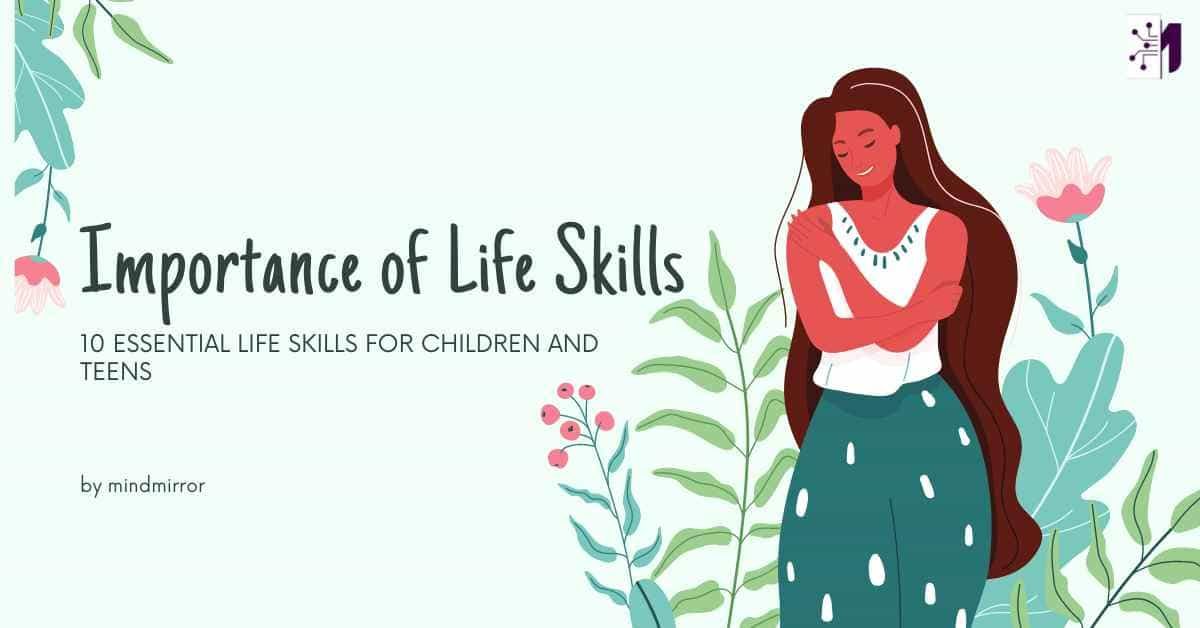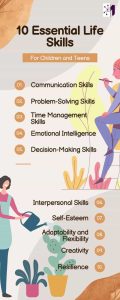Life skills education is crucial for personal and professional development. It teaches individuals the necessary skills to navigate through life and handle various challenges that come their way. These skills include problem-solving, decision-making, communication, time management, emotional intelligence, interpersonal skills, self-esteem, adaptability, creativity, and resilience. Without these skills, it can be difficult to achieve success and happiness in life. In this blog post, we will explore the importance of life skills and the 10 essential life skills everyone should learn to lead a fulfilling life.
What are Life Skills?
Life skills, also known as soft skills, are a set of abilities that are essential for personal and professional success. They include a wide range of capabilities such as problem-solving, critical thinking, effective communication, time management, emotional intelligence, and many others. These skills help individuals navigate through difficult situations, make better decisions, and improve overall well-being. They can be applied to many different areas of life, from personal relationships to professional development. They are not only beneficial for achieving success but also for leading a happier and more fulfilling life.
The Importance of Life Skills
Life skills are essential for children and teenagers as they help them navigate and succeed in the world around them. These skills help them build self-confidence, make smart decisions, and effectively communicate with others. It also prepares them to handle the various challenges that come with growing up and being an adult.
One of the most important benefits of life skills is that they help children and teens develop self-awareness and self-regulation. This means they learn to understand their own emotions, thoughts, and behaviors, as well as how to manage them. This is crucial for their mental and emotional well-being.
Life skills also help children and teens build strong relationships with others. Interpersonal skills such as communication, empathy, and conflict resolution are crucial for building and maintaining healthy relationships. This is important for their social and emotional development and can have a positive impact on their academic and professional lives.
In addition, life skills help children and teens become more responsible and independent. Time management, decision making, and problem-solving skills are all crucial for taking on more responsibility and making smart choices. These skills are also important for their academic and professional success as they help them prioritize and plan effectively.
Overall, life skills are essential for children and teens to be able to navigate and succeed in the world around them. They help them build self-confidence, make smart decisions, and effectively communicate with others. It also prepares them to handle the various challenges that come with growing up and being an adult.
Also Read:
10 Essential Life Skills For Children and Teens
Life skills are essential for children and teens to navigate the world around them. These skills include the ability to communicate effectively, manage emotions, problem-solve, and make decisions. In today’s fast-paced world, it is more important than ever for children and teens to develop these skills in order to succeed in life. In this blog post, we will discuss 10 essential life skills for children and teens, including communication skills.
Here are 10 essential life skills for children and teens:
Communication Skills
Communication skills are essential for children and teens to navigate through daily interactions and relationships. It includes the ability to express oneself effectively and understand others, whether it be through verbal or non-verbal means. Good communication skills can help children and teens build strong relationships, resolve conflicts, and achieve their goals.
The development of communication skills starts at a young age, and it is important for parents and caregivers to provide children with opportunities to practice and improve their communication skills. This can be done through activities such as storytelling, dramatic play, and discussions.
As children and teens grow older, they will encounter more complex communication situations such as participating in group discussions, giving presentations, and negotiating with others. It is important for them to learn how to adapt their communication style to different situations and audiences.
Effective communication skills also involve listening actively and empathetically. Children and teens should be taught the importance of paying attention to the speaker, asking clarifying questions, and responding appropriately.
In today’s digital age, children and teens should also learn how to communicate effectively through digital means such as email, text messages, and social media. It’s important for them to understand the potential risks and consequences of their digital communication and to be able to use digital communication tools appropriately.
Problem-Solving Skills
Problem-solving skills are crucial for children and teens to navigate through the challenges they encounter in their daily lives. These skills allow them to analyze a situation, generate potential solutions, and make decisions to resolve the problem at hand.
The development of problem-solving skills starts at a young age. Parents and caregivers can provide children with opportunities to practice problem-solving through activities such as puzzles, games, and open-ended play. As children and teens grow older, they can be presented with more complex problems and encouraged to think critically and creatively to find solutions.
Teaching children and teens how to break down a problem into smaller parts can also be helpful. This involves identifying the problem, gathering information, generating potential solutions, evaluating the solutions, and making a decision.
Another important aspect of problem-solving is learning to cope with failure and uncertainty. Children and teens should be taught that it’s normal to encounter obstacles and that failure is a natural part of the problem-solving process. They should also be encouraged to persevere and not give up easily.
In addition, problem-solving skills are also critical for children and teens to develop resilience and adaptability, which will be essential for their future success.
Time Management Skills
Time management skills are essential for children and teens to be able to balance their responsibilities and make the most of their time. It includes the ability to prioritize tasks, set goals, and plan effectively. It also includes the ability to stay organized and avoid procrastination. Parents and caregivers can help children and teens develop time management skills by setting a schedule and routine for daily activities, giving them more autonomy and responsibility in managing their own time, and teaching them how to avoid procrastination and distractions.
Emotional Intelligence
Emotional intelligence, also known as emotional quotient (EQ), refers to the ability to identify, understand, and manage one’s own emotions, as well as the emotions of others. It includes the ability to recognize and express emotions, use emotions to guide thought and behavior, and regulate emotions in oneself and others.
Teaching emotional intelligence to children and teens can help them develop the ability to understand and manage their emotions, which is important for their overall well-being and success in life.
One way to teach emotional intelligence is to provide children and teens with a safe and supportive environment where they can express their emotions and feelings. Parents and caregivers can also model healthy emotional expression and encourage children and teens to talk about their emotions.
Another way to teach emotional intelligence is to teach children and teens how to recognize and understand the emotions of others. This can include teaching empathy and active listening skills, and encouraging children and teens to consider the perspective of others.
It’s also important to teach children and teens how to regulate their emotions. This can involve teaching them coping mechanisms for dealing with difficult emotions, such as deep breathing and mindfulness techniques, as well as teaching them how to set and achieve goals.
Decision-Making Skills
Decision-making skills refer to the ability to evaluate options and make choices based on a set of criteria. It is the process of identifying and choosing alternatives based on the values and preferences of the decision-maker.
Teaching decision-making skills to children and teens can help them develop the ability to make informed and responsible choices, and to take ownership of their actions. It can also help them to become more confident and self-reliant, and to develop a sense of personal responsibility.
One way to teach decision-making skills to children and teens is to provide them with opportunities to make small decisions on their own. For example, allowing them to choose their own clothes or decide what they want to eat for dinner. As they get older, you can give them more complex decisions to make, such as what extracurricular activities they want to participate in or what classes they want to take.
Another way to teach decision-making skills is to teach children and teens how to evaluate options and make choices based on a set of criteria. This can include teaching them how to weigh the pros and cons of different options, how to consider the potential consequences of their choices, and how to make decisions based on their values and goals.
It’s also important to teach children and teens how to accept the consequences of their decisions, whether they are positive or negative. This can include teaching them how to learn from their mistakes, how to bounce back from setbacks, and how to take responsibility for their actions.
Interpersonal Skills
Interpersonal skills refer to the ability to communicate effectively with others, build and maintain relationships, and navigate social situations. They are essential for children and teens as they help them to build and maintain healthy relationships, both at home and in the community.
One of the most important interpersonal skills is effective communication. This includes the ability to express oneself clearly and listen actively to others. Children and teens who have strong communication skills are better able to express their needs, wants and feelings, and are more likely to be able to resolve conflicts peacefully.
Another important interpersonal skill is the ability to build and maintain relationships. This includes the ability to make friends, collaborate with others, and get along with people from diverse backgrounds. Children and teens who have strong relationship skills are more likely to have a positive influence on those around them, and to form supportive networks that will last a lifetime.
Self-Esteem
Self-esteem refers to an individual’s overall sense of self-worth and self-acceptance. It is the foundation for children and teens to be able to believe in themselves, set healthy boundaries, and make positive choices in life.
Low self-esteem can lead to children and teens feeling insecure, inadequate, and vulnerable. They may have difficulty setting healthy boundaries, be more likely to fall victim to peer pressure, and may struggle to make positive choices. On the other hand, children and teens with high self-esteem are better able to navigate challenges and difficult situations, build healthy relationships, and make positive choices.
There are several ways to help children and teens develop healthy self-esteem. One of the most important is positive reinforcement. This can include praising children and teens for their efforts, rather than just their accomplishments, and providing them with constructive feedback.
Adaptability and Flexibility
Adaptability and flexibility are essential life skills for children and teens as they help them to navigate through life’s unexpected changes and challenges. These skills enable them to adapt to new situations, think on their feet, and find new solutions to problems. They also allow them to be open-minded and consider alternative perspectives, making them more resilient and better able to deal with adversity. Developing adaptability and flexibility also helps children and teens to become more confident and independent, allowing them to make their own decisions and take charge of their own lives.
Creativity
Creativity is an essential life skill for children and teens as it allows them to think outside the box and come up with new and innovative ideas. It is the ability to see things in a different way and to approach problems from a unique perspective. Creativity can be nurtured through various activities like art, music, writing, and drama. Encouraging children and teens to express themselves creatively can help them to develop their imagination and to become more confident in their abilities. It also helps them to think critically and to problem-solve in an effective way. Furthermore, fostering creativity in children and teens can also lead to a greater appreciation for the arts and a lifelong love of learning.
Resilience
Resilience is the ability to bounce back from challenges and adversity. It is an essential life skill for children and teens as it helps them to cope with difficult situations and to recover from setbacks. Children and teens who are resilient are able to manage stress and anxiety, maintain a positive outlook, and learn from their mistakes. They are also better able to handle disappointment and find meaning and purpose in difficult situations. Resilience can be developed through various activities such as mindfulness, exercise, and therapy. Teaching children and teens how to develop resilience will help them to become more confident and independent, allowing them to make their own decisions and take charge of their own lives. Furthermore, building resilience in children and teens will also help them to become more successful in their future endeavors.
Conclusion
In conclusion, life skills education is vital for individuals of all ages. It equips them with the tools they need to navigate through life and handle the various challenges that come their way. Developing these skills early on in life can lead to a more successful and fulfilling future. It is important for educators, parents, and mentors to actively teach and encourage the development of these skills in children and teens. By learning and mastering these skills, individuals can achieve their goals, build healthy relationships, and lead happy and satisfying life. It is never too late to start developing these skills and the benefits will be lifelong.





